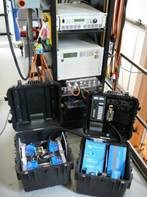Volts Energies delivers on challenge to build Hybrid Power System

Volts Energies has designed and built a prototype Hybrid Power System for remote off-grid applications in collaboration with researchers working at Natural Resources Canada’s CanmetENERGY Ottawa Research and Development Laboratories.
Remote camps are presently served by diesel generators that operate at one fixed speed, regardless of the load on the system, which leads to inefficient fuel utilization. In the near future, generators will operate over a range of speeds, depending on the load. This will lead to fuel savings as well as reductions in noise – especially for operation at night – when the electrical load on the system is light and the speed of the generator can be reduced accordingly.
Advanced power conversion technology is required to allow a diesel engine to run at different speeds. This technology exploits the use of powerful permanent magnets located in the generator which improve the efficiency of electrical generation across a range of operating speeds. Customers in remote areas are often interested in the use of renewable energy and are asking for the ability to generate electricity by using solar panels. System operating efficiency can also be improved by electricity storage in a battery bank, especially if the diesel engine can be shut down for a period at night. CanmetENERGY Ottawa researchers issued the challenge of combining solar generation, electricity storage and variable speed power conversion technology to Volts Energies.
“Our Government’s collaboration with partners has helped to create viable clean energy industries by advancing ideas from research and development to demonstration and then to market deployment,” said Minister Oliver. “Projects like Volt Energies’ hybrid power system help drive energy innovation, stimulate the local economy and protect the environment.”
This challenge was accepted and a prototype system has now been delivered to CanmetENERGY Ottawa for evaluation and testing. It consists of two rugged, field ready cases. One contains the battery system and the other contains the power conversion electronics which can harvest the electricity from solar panels when it is available and switch to generator power when needed.
“This new hybrid system offers a high-end technology and an ergonomic design. We are happy to collaborate with Natural Resources Canada’s CanmetENERGY Ottawa Research Centre on this product. This unit will allow our off-grid customers to be more mobile and efficient,” said Sébastien Caron, Volts Energies president. CanmetENERGY Ottawa researchers will now study the performance of the system over a wide range of conditions this summer.
Innovative characteristics of the system are its portability and ability to use two different power sources, separately or combined. The system has been designed to be “man portable” for use in tents and small shelters commonly used for hunting camps, mining exploration sites and emergency response situations. An important part of the design relates to the efficiency of absorbing and converting the power that is taken from the two sources, through the battery and to the connected loads. The solution recognizes the synergy between the uncontrolled variable power produced by the solar panels and the controlled variable power produced by the diesel generator, which now share the same electronics, reducing the overall cost of the system. The resulting Hybrid Power System leads to fuel savings through variable speed operation, efficient power conversion, electricity storage, and solar generation. It is hoped the system will maximize the use of solar energy when available and minimize the use of diesel fuel at night. Volts Energies will continue to collaborate with researchers at CanmetENERGY in order to prepare the next generation of products that will meet the needs of our customers.

